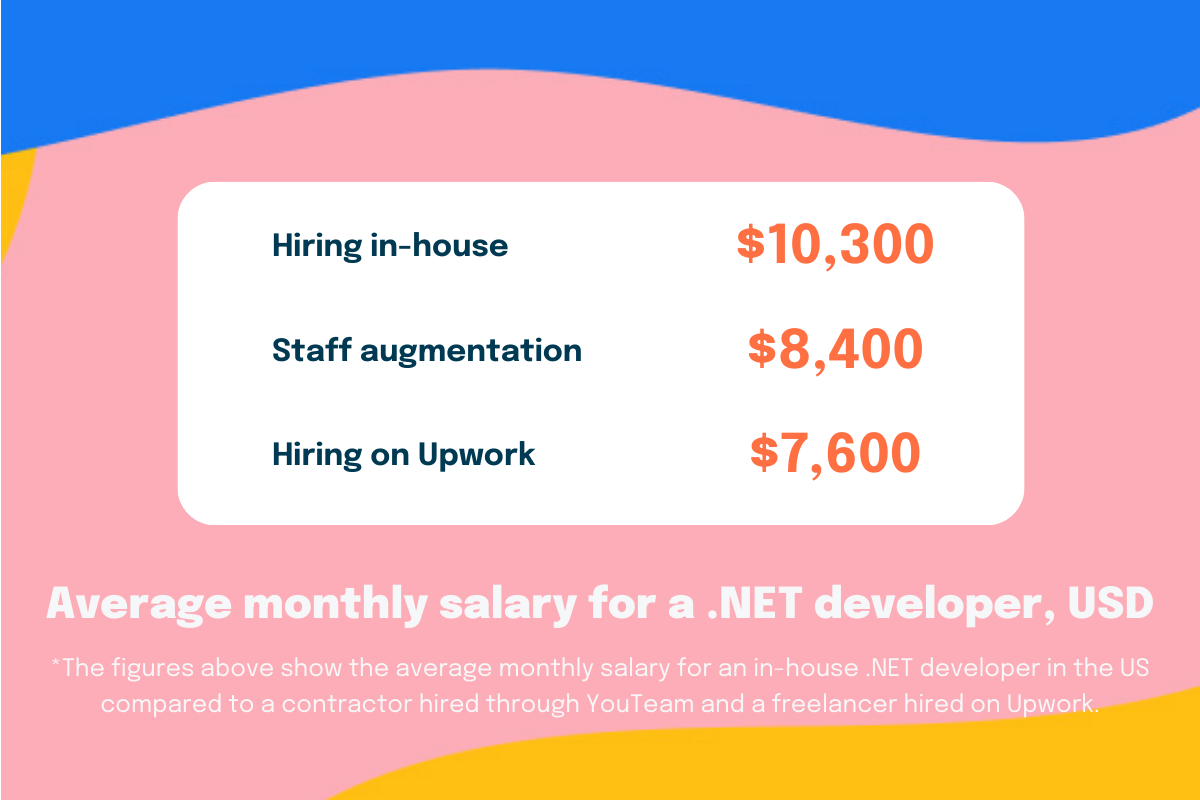The world is becoming increasingly digitally oriented, which constitutes a higher demand for quality developers who work on this digitalization. Unfortunately, there is a definite lack of tech talent, so finding the needed software engineers for any tech project can be challenging.
This article will give you valuable insights on finding and hiring the most talented .Net developers in the market today, as well as tips on evaluating and managing their skills better. So, let’s start by reviewing what you should know about .Net technology before looking to hire engineers.
Table of Contents
What is .Net technology?
It is crucial for the person responsible for hiring a .Net developer to understand what .Net is fully. It’s an open-source software development framework developed by Microsoft and runs primarily on Windows. The main function of .Net is to provide developers with a controlled environment to install and execute, but not limited to, Windows-based software. For example, with the help of .Net Core, it can also support Java-based software, as well as more than 60 programming languages, such as С#, F#, PowerShell, Visual Basic and .Net, which allows a knowledgeable developer to write code in two or more languages simultaneously.
So, speaking broadly, .Net is a framework with which you can create a wide range of desktop, web, and mobile applications for highly complex business purposes.
Skills to look for in .Net developers
Here is a general checklist of the .Net framework’s features and particularities to keep in mind when hiring a .Net developer:
- .Net supports a multitude of different programming languages. A decent .Net developer should be familiar and proficient with several frameworks and libraries, such as MVC, Entity Framework, or ASP.NET Web API. These are the most often used in building commercial apps.
- .Net is exceptionally vast, so it should not necessarily be a disadvantage if a developer is not familiar with one of the frameworks in your job description. Even if an applicant is currently unenlightened, the numerous .Net frameworks have many functional and structural features in common, and migrating from one framework to another would not become an issue for a knowledgeable developer, as the basics are similar.
- If you are looking for a senior-level developer, take more specific notice of the applicant’s commercial experience. A junior-level developer would most likely be unable to provide much value to your enterprise coding simply because of inexperience. Junior specialists are more helpful to help in basic tasks and grow with their senior teammates.
Here is a list of frameworks that a worthwhile candidate for a front-end .Net developer position should be familiar with:
- Angular.js
- JavaScript
- CSS
- HTML
- Bootstrap
If you are in search of a back-end developer, pay attention to whether the applicant knows:
- .NET Web API
- .NET MVC
- Signal R
Generally, a worthwhile applicant for the position of .Net developer should have extensive expertise in the following:
- .NET programming concepts
- Object-oriented programming concepts
- Windows controls
- Windows workflow foundation
Where to hire .Net developers
Understanding where developers spend their time online and offline, connecting and communicating with each other, can help broaden your overall understanding of the hiring capabilities.
Outsourcing destinations
When looking to hire .Net developer, you can try looking at some of the popular outsourcing destinations. The widely known places are Latin America and Eastern Europe. Countries like Ecuador, Peru, Poland, and Ukraine have a wide talent pool, their engineers have vast expertise in popular and rare technologies. Thus, compared to the countries of North America and Western Europe, these destinations are more cost-effective due to lower costs of living. Here let’s look at the popular countries of both Latin America and Eastern Europe and the average rate of .Net developers.
|
Latin America |
|
| Country |
Average .Net developer salary, $ |
| Mexico | $65,000 |
| Argentina | $38,000 |
| Brazil | $48,000 |
| Colombia | $45,000 |
| Chile | $39,000 |
| Costa Rica | $28,000 |
| Uruguay | $36,000 |
Source: Payscale, Glassdoor
|
Eastern Europe |
|
| Country |
Average .Net developer salary, $ |
| Bulgaria | $38,000 |
| Poland | $48,000 |
| Romania | $26,000 |
| Moldova | $25,000 |
| Hungary | $45,000 |
| Ukraine | $43,000 |
| Czech Republic | $47,000 |
Source: Payscale, Glassdoor
Popular platforms
If you are looking to hire an in-house developer, you can post your job description on LinkedIn or local job boards and look for suitable developers’ CVs there. However, you should understand that exceptional .Net developers are usually not actively seeking a job. They are working on interesting projects for great companies. You should reach them through different channels. We suggest looking for great .Net Developers on the following sites:
- GitHub is the largest developers’ community globally, with many skilled .Net developers who share their experiences there.
- Stack Overflow is also a large developers’ community.
- Reddit, where you can find communities with specific topics, including programming and .Net development.
- Forums and groups on social media are also good places to look for, especially if you can find a group of specific technologies you need, like .Net.
If you need to hire a freelancer, you can look for them on platforms like Upwork. There is a great number of freelance applicants that are actively searching for work. However, we’d like to emphasize that freelancers are not a good choice for core development, as they usually are not deeply interested in the project. They are more helpful as additional power for your core team.
Also, if you need a dedicated developer to work on your project with your in-house team and want this specialist to focus on your tasks, consider hiring a contractor. With YouTeam, you can get an experienced .Net developer within two weeks.
Browse 500+ Dev Teams Available for Hire
If you want to outsource your development, you can hire a dedicated team from outsourcing agencies worldwide. Just consider which location would be most suitable for you and find a reliable software development company there.
If you are struggling to hire quality software engineers, download our guide to overcoming the developer shortage to learn how to improve hiring speed and choose the hiring model that works best for you.
Tips on hiring .Net developers
Be specific in your job description
Be straightforward in what you look for and list important requirements in your job offering. That will ease the search process for both you and the developers. To cover all the necessary points, you should consider the following:
- Give a brief job description and responsibilities the developer should be able to take on;
- List all the required programming languages, experiences, methodologies, etc., that would be necessary for the job;
- Mention the industry and some details of the project, so you’ll more likely get applicants that previously had a similar experience.
Provide tech interviews
Ideally, it would help if you had a CTO or a senior developer to evaluate candidates’ tech skills. You can also use online coding test tools (Woven, Hatchways, HackerRank) to help you in the process.
Evaluate soft skills
.Net developers’ soft skills help them build relationships, solve problems, and positively impact their teams and projects. Check out our database of remote developer interview questions to assess their personality traits, remote communication skills, and time management.
Questions to ask when interviewing .Net developers
We cover just the basics in this article, but more questions you can find in our article: “Building a Winning Team: Top 10 Middle .Net Developer Interview Questions (+Expected Answers)”.
A technical specialist on the team can take the following question ideas to see if the .Net developer meets the company’s expectations and project requirements. You can ask the developer to explain everything in simple terms — this will show their ability to communicate clearly.
- How does the concept of inheritance work in the .Net framework?
- Explain the difference between managed and unmanaged code.
- What is lock statement in C#?
- Discuss the differences between class and struct.
- What are the advantages of using lazy loading?
- Describe the garbage collection process.
- What are the differences between interface and abstract class in .NET?
- List the events in the page life cycle.
In addition, the company can ask about the candidate’s professional qualities, experience, and recent accomplishments in .Net, using the following questions:
- What are you looking for in your next position?
- What are your best professional qualities?
- What was your recent professional achievement using the .Net framework? Are there any projects in which you have been particularly successful?
- How long would it take you to learn a new tool or a framework?
- What .Net features do you find difficult to use?
How much does it cost to hire .Net developers?
The cost of hiring a developer always depends on different aspects — are you looking for an in-house engineer, want to hire a contractor, or need a freelance .Net developer? Are you considering developers from the US only, or are you open to offshore? The developer’s location, experience, and skills all influence salary requirements.
The table below compares the average cost of hiring an in-house US .Net developer vs. hiring a contractor with YouTeam vs. hiring a freelancer on Upwork. To understand the final cost of hiring, we have added information about extra expenses and hiring costs.
| In-house hiring in the US | Staff augmentation via YouTeam | A freelance developer on Upwork | |
| Average monthly payment to .Net Developer | $10,300 | $8,400 | $7,600 |
| Extra costs for the company | Taxes, bonuses, non-financial benefits, office rent, and support | YouTeam commission | Upwork commission |
| Hiring costs | HR costs, job promotional ads | YouTeam does candidate sourcing and vetting and assists with interviews | Managers’ time for candidate sourcing, screening, and interviewing |
Sources: Glassdoor, YouTeam, Upwork
A video guide for hiring .Net developers
Wrapping up
When it comes to recruiting .Net developers, there are two main things — knowledge and communication. As a person responsible for the actual hiring, you should know whom you are looking for and where to look. After reading the article, the hiring process should become more structured for you, and you should have a better understanding of where to start and how to succeed in finding the right .Net developer for your next project.









